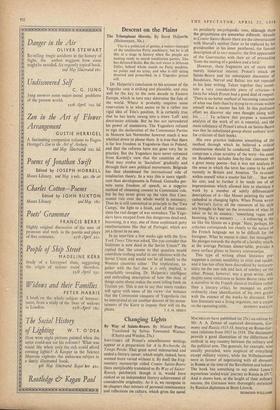Changing Lights
By Way of Sainte-Beuve. By Marcel Proust. Translated by Sylvia Townsend Warner. (Chatto and Windus, 25s.) INEVITABLY all Proust's miscellaneous writings appear as a preparation for A la Recherche du Temps Perdu. That great novel summarised and ended a literary career, which might, indeed, have seemed more varied without it. By itself the frag- mentary manuscript called Contre Sainte-Beuve (here inexplicably translated as By Way of Sainte- Beuve), patchwork though it is, would have ranked as an independent literary achievement of considerable originality. As it is, we recognise in its chapters that mixture of personal reminiscence and reflections on culture, which gives the novel its peculiarly encyclopedic tone, although there the proportions are somewhat different. Already in Contre Sainte-Beuve there are the conversations with Marcel's mother (later to be replaced by his grandmother in his inner pantheon), the famous description of la race maudite, the first appearance of. the Guermantes with their air of proceeding 'from the mating of a goddess and a bird.'
However, these fragments are of more than merely historical interest. Proust's attack on Sainte-Beuve and his subsequent discussion of Baudelaire, Nerval and Balzac are not repeated in his later writing. Taken together they consti- tute a very considerable piece of criticism—a form for which Proust had a good deal of respect. 'There is no better method of becoming conscious of what one feels than by trying to re-create within oneself what a master has felt. In this profound effort we discover our own thought along with his. . . .' To achieve this purpose a sustained analysis of the work of art is essential, and the main substance of Proust's attack on Sainte-Beuve was that he substituted gossip about authors' lives for criticism of their books.
His own practice indicates something of the method through which he believed a critical examination should be conducted. That method comprises a close scrutiny of the texts—his essay on Baudelaire includes line-by-line comment on a great many poems—but it was not analysis in the sense in which the term has come to be used recently in Britain and America. 'To re-create within oneself what a master has felt ...' that was his aim, and to further it he made use of an impressionism which allowed him to elucidate a work by a number of subtly differentiated descriptions of it—like Monet painting the same cathedral in changing lights. When Proust writes of Nerval's Sylvia all the resources of his style are brought to bear on the evocation of what he takes to be its essence : 'something vague and haunting, like a memory . . a colouring in the air like the bloom on a grape.' Here, perhaps, his criticism corresponds too closely to the nature of the French language not to be difficult for the foreigner. What he means is clear, but intangible. He plunges towards the depths of a lucidity which, at the average Parisian dinner-table, provides a mere surface glitter to literary conversation.
This type of writing about literature pre- supposes a certain sensibility in critic and reader, and it has too often been discredited by sentimen- tality on the one side and lack of subtlety on the other. Proust, however, was a great writer, and, despite some unfairness to Sainte-Beuve (who was a moraliste in the French classical tradition rather than a literary critic), he managed an extra- ordinarily close identification of his own genius with the essence of the works he discussed. For him literature was a living organism, not a corpse














































 Previous page
Previous page